 SIMON & SCHUSTER BOOKS FOR YOUNG READERS An imprint of Simon & Schuster Childrens Publishing Division 1230 Avenue of the Americas, New York, New York 10020 www.SimonandSchuster.com Text and photographs copyright 2005 by Chun Yu Calligraphy copyright 2005 by Lian Yu All rights reserved, including the right of reproduction in whole or in part in any form. S IMON & S CHUSTER B OOKS FOR Y OUNG R EADERS is a trademark of Simon & Schuster, Inc. Book design by Mark Siegel The text for this book is set in Mrs. Eaves. Library of Congress Cataloging-in-Publication Data Yu, Chun, 1966 Little green : growing up during the Chinese Cultural Revolution / Chun Yu. cm. cm.
SIMON & SCHUSTER BOOKS FOR YOUNG READERS An imprint of Simon & Schuster Childrens Publishing Division 1230 Avenue of the Americas, New York, New York 10020 www.SimonandSchuster.com Text and photographs copyright 2005 by Chun Yu Calligraphy copyright 2005 by Lian Yu All rights reserved, including the right of reproduction in whole or in part in any form. S IMON & S CHUSTER B OOKS FOR Y OUNG R EADERS is a trademark of Simon & Schuster, Inc. Book design by Mark Siegel The text for this book is set in Mrs. Eaves. Library of Congress Cataloging-in-Publication Data Yu, Chun, 1966 Little green : growing up during the Chinese Cultural Revolution / Chun Yu. cm. cm.
A Paula Wiseman book. ISBN 0-689-86943-6 ISBN 978-1-44246-032-4 (eBook) 1. Yu, Chun, 1966Juvenile literature. 2. ChinaHistoryCultural Revolution, 1966-1976Personal narrativesJuvenile literature. [1.
Yu, Chun, 1966- 2. ChinaHistoryCultural Revolution, 1966-1976Personal narratives. 3. ChinaSocial life and customs1949-1976.] I. Title: Growing up during the Chinese Cultural Revolution. Title. Title.
DS778.7.Y78 2005 951.056dc22 2003027433 For Mama and Baba, who gave me this gift of life. For Nainai, who brought me up. For Gege and Sansan, who have shared this life with me.

I was born in a small city near the East Sea, when the Great Cultural Revolution began. My name is Xiao Qing, Little Green, my country Zhong Guo, the Middle Kingdom. When I was ten years old, our leader died and the revolution ended.
And this is how I remember it.
BEGINNING



Beginning
The year was 1966, I was told, five oclock on a late spring afternoon. Mama had been in labor for eight hours. Baba was pacing up and down in the hall, having just come from a mass political meeting in the city square. The doctor held me up in the air; I was a ten-pound girl, screaming loud with a little red face. Outside the world was changing, a revolution was in the making for my country.
Darkening clouds gathering in the sky above, smothering thunders rolling on the horizon afar. Mama sat on Babas bike, holding me tight in her arms; Baba peddled toward home against the cold night wind. Mamas face was as pale as paper; she caught cold on the way home, during the weakest time after her labor.
Little Green
Little GreenXiao Qing was the name they gave me. Qing , the green of tree leaves in early spring, of clear water in a deep pond, my baba said; of beautiful youth, the evergreen of life, my mama said; and of precious jade worn close to the heart, my nainai said.
Mamas Name Has a Phoenix
Mama still says, telling me the story, luckily for the illness, she escaped the first struggle meeting in the school where she taught just by a day.
The beginning of the Great Proletarian Cultural Revolution was announced, people waving red flags on the streets and shouting loud the slogans on their red banners: Ten Thousand Years Chairman Mao! Ten Thousand Years the Great Proletarian Cultural Revolution! Chairman Mao called to the country, Lets hold the large flags of the Great Proletarian Cultural Revolution and completely expose the reactionary position of those so-called academic authorities. The school where Mama taught was in the countryside, but there was no escape even there. It was declared to be a revolutionary battlefield, like many other schools around the country. The day before Mama went back, in the school ceremony hall the Red Guards stood on the stage, the teachers were gathered around the stage, and other students gathered around them. The teachers picked were denounced on the stage, forced down on their knees and beaten in front of the crowd. They were asked to slap their own faces while denouncing themselves aloud until the Red Guards were satisfied.
Mamas name has a phoenix. The only child of our grandma and grandpa, they called her Cheng-Feng, which means becoming a phoenix. You have no idea what trouble this could be, Mama told me. Phoenix is too traditional for the revolution. Some said the old world needed to be destroyed for the new world to come. Thats the idea of the revolution I was born into.
That summer around the countryour Middle Kingdom so many people died, I was told many years later.
An Uncle Teacher Became a Counterrevolutionary
Spring 1967 The Great Proletarian Cultural Revolution, Chairman Mao said, is a great revolution that will touch peoples souls. A year after the revolution started, Liu Shao-Qi, the other chairman of the country then, besides Chairman Mao, was downed with completely. People used to call him respectfully Our comrade Liu Shao-Qi, but an uncle teacher used these words one day too late. It was his turn to criticize the denounced leader in a struggle meeting. Our comrade Liu Shao-Qi, he started with.
Just as he realized the mistake and turned pale, his head was already forced down. Down with the counterrevolutionary! people shouted, throwing their arms up in the air, trembling at this new discovery. The uncle teacher slapped his own face, calling himself one who deserves to die. He carried the label ever since I remembered.
A Dream
A dream was the first thing I ever remembered. Mama was holding me in her arms, snakes hanging from a big hollow tree, wolves and hyenas running on the ground.
Mama was standing among these things, holding me tight in her arms.
Go Up to the Mountains and Go Down to the Country
1968 I have a brother two years older, who I called Gege. Mama told me that until the year I was two years old and Gege was four, the three of us had lived and traveled between our home in the city where Baba worked and the country school where Mama taught. The city, like everywhere in the country, had been deep in revolution. The streets were filled with roaming Red Guards, struggle meetings were held in every work unit, and counterrevolutionaries were downed with every day. A time of unpredictable changes, a city of unrest.
Chairman Mao called to the whole country: Go up to the mountains and go down to the country, to receive reeducation from poor and lower-middle-class peasants. Baba was sent down from the city to labor in a May Seventh Cadre School in the countryside. We lost our home in the city. My gege and I stayed with Mama in the country school after Baba was gone.
COUNTRY



The Country Middle School
We lived in a long one-story house facing south in the country middle school. It had gray-blue tiles on the roof with a brick wall of the same color.
Eleven other teachers families lived in the same building. Eight of the families had children; there were twelve of us altogether. A river ran in front of the house. Past the full-moon gate to the west of the house, a brick bridge crossed the river. On the other side of the river was the school where Mama taught. Between the house and the river was a long stretch of garden.
Next page


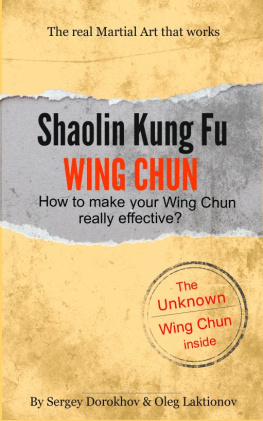
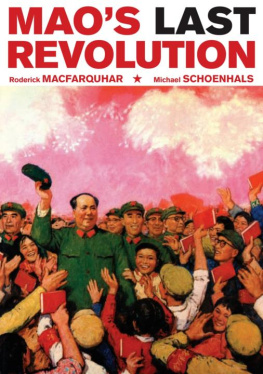
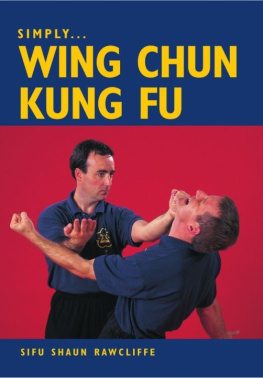

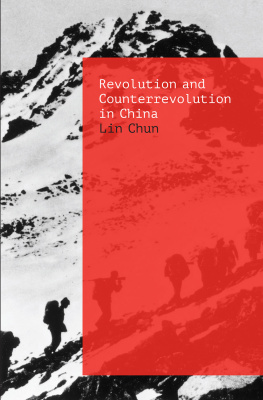
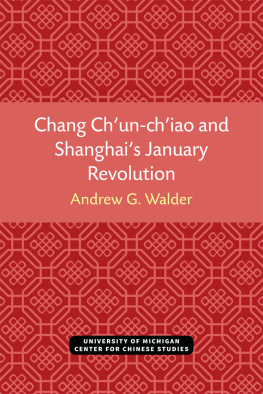
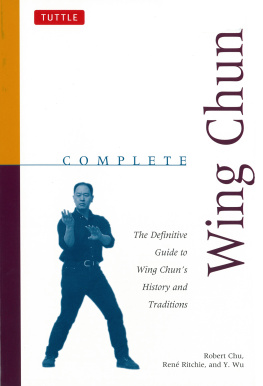

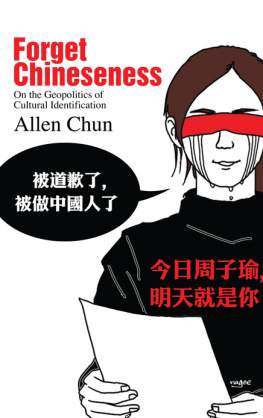
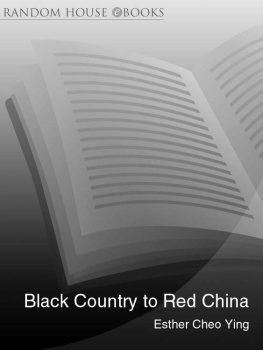
 SIMON & SCHUSTER BOOKS FOR YOUNG READERS An imprint of Simon & Schuster Childrens Publishing Division 1230 Avenue of the Americas, New York, New York 10020 www.SimonandSchuster.com Text and photographs copyright 2005 by Chun Yu Calligraphy copyright 2005 by Lian Yu All rights reserved, including the right of reproduction in whole or in part in any form. S IMON & S CHUSTER B OOKS FOR Y OUNG R EADERS is a trademark of Simon & Schuster, Inc. Book design by Mark Siegel The text for this book is set in Mrs. Eaves. Library of Congress Cataloging-in-Publication Data Yu, Chun, 1966 Little green : growing up during the Chinese Cultural Revolution / Chun Yu. cm. cm.
SIMON & SCHUSTER BOOKS FOR YOUNG READERS An imprint of Simon & Schuster Childrens Publishing Division 1230 Avenue of the Americas, New York, New York 10020 www.SimonandSchuster.com Text and photographs copyright 2005 by Chun Yu Calligraphy copyright 2005 by Lian Yu All rights reserved, including the right of reproduction in whole or in part in any form. S IMON & S CHUSTER B OOKS FOR Y OUNG R EADERS is a trademark of Simon & Schuster, Inc. Book design by Mark Siegel The text for this book is set in Mrs. Eaves. Library of Congress Cataloging-in-Publication Data Yu, Chun, 1966 Little green : growing up during the Chinese Cultural Revolution / Chun Yu. cm. cm.
 I was born in a small city near the East Sea, when the Great Cultural Revolution began. My name is Xiao Qing, Little Green, my country Zhong Guo, the Middle Kingdom. When I was ten years old, our leader died and the revolution ended.
I was born in a small city near the East Sea, when the Great Cultural Revolution began. My name is Xiao Qing, Little Green, my country Zhong Guo, the Middle Kingdom. When I was ten years old, our leader died and the revolution ended. 


